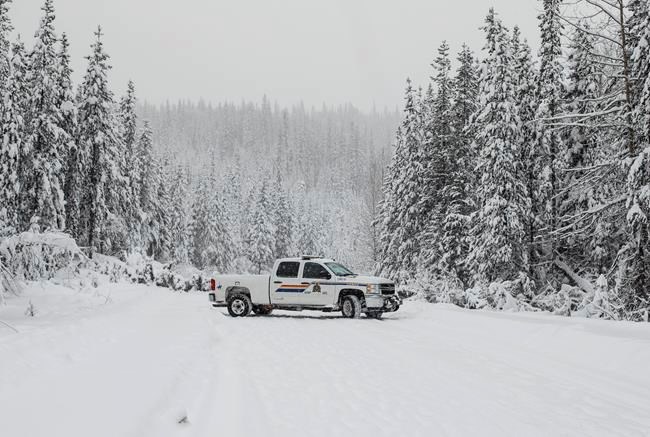PRINCE GEORGE, B.C. — A photojournalist and a documentary filmmaker have been released by a B.C. Supreme Court judge, three days after being arrested while covering the RCMP's enforcement of an injunction against pipeline protests in northern British Columbia.
Amber Bracken, who was on assignment for B.C.-based outlet The Narwhal, and documentarian Michael Toledano were released on the condition that they appear in court in February. They must also comply with the terms of the injunction order first granted to Coastal GasLink by the same judge in December 2019.
The arrests came after members of the Gidimt'en clan, one of five in the Wet'suwet'en Nation, set up blockades along a forest service road on Nov. 14. The road was cleared last Thursday, the RCMP said.
In a statement released Monday, Assistant RCMP Commissioner Eric Stubbs said the Mounties understand the important role of the media and no one was arrested for being a journalist or doing their job.
He said two people who later identified themselves as journalists were "inside barricaded structures with others who were the focus of enforcement efforts." The pair were among a group of 11 people who were given the opportunity to leave the structures before police forced open the door, he said in the statement.
They did not identify themselves during discussions with police beforehand, but indicated they were journalists once police began making arrests, he said.
Bracken's lawyer, David Sutherland, said in an interview that his client wore a label on her clothing showing she was a member of the press and carried an assignment letter from the editor-in-chief of The Narwhal.
Opposition among Wet'suwet'en hereditary chiefs to the 670-kilometre pipeline sparked rallies and rail blockades across Canada early last year, while the elected council of the Wet'suwet'en First Nation and others nearby have agreed to the project.
A memorandum of understanding had been signed between the hereditary chiefs and the federal and provincial governments, easing tensions up until now.
The pipeline would transport natural gas from Dawson Creek in northeastern B.C. to a processing facility in Kitimat. It is more than halfway finished with almost all the route cleared and 200 kilometres of pipeline installed, Coastal GasLink has said.
The Canadian Association of Journalists condemned the arrests of Bracken and Toledano. In an open letter signed by several dozen news outlets and press freedom organizations, it called on Public Safety Minister Marco Mendicino to "bring about a swift resolution respecting journalists' fundamental rights."
Asked about the arrests, Mendicino said it was not for him or the government to adjudicate the case or to direct police operations on the ground, but it's important that journalists can do their jobs without interference.
Journalists should be able to "go to the sites, make observations, report on those events, and do it in a way that is consistent with the Constitution as a pillar of our democracy," he said Monday in Ottawa. "At the same time, the government does not direct operations on the ground, we are not in control of court processes."
It was "very positive" that Bracken had been freed, Mendicino added.
"My hope is that all of the reporters who seek to inform the public about very important and relevant events are able to exercise that right."
B.C. Public Safety Minister Mike Farnworth said a free press is critical to democracy and he hoped the situation would not escalate.
The province has been doing "a significant amount of work over the last number of months to try and de-escalate tensions in the area," he told a news conference.
— By Brenna Owen in Vancouver
This report by The Canadian Press was first published Nov. 22, 2021.
The Canadian Press


